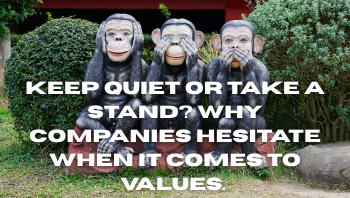Text: Keep quiet or take a stand? Why companies hesitate when it comes to values
The logic of value positioning vs. the reality of corporate reluctance.
Although, as the introduction shows, it is almost logically compelling, what is currently preventing companies from positioning themselves clearly on the subject of values? Why this reluctance in an age that demands transparency and authenticity? Well, the exact opposite is being demanded just as loudly. That is why many are hesitating. There are reasons for this hesitation that go deeper than a mere lack of communication.
1. Fear of the shitstorm: the sword of Damocles of public opinion
In a polarized public, any clear position can boomerang. Anyone who stands up for diversity, equality and inclusion (DEI) risks the wrath of conservative circles or the scorn of those who have chosen “wokeness” as an enemy - see the sometimes violent reactions to campaigns by companies such as Bud Light in the USA.
2. Internal disagreement: when values become a test
Values are not mathematical formulas. What is a non-negotiable principle for one manager may be of secondary importance or even meaningless to another. And the “political division of societies” that has often been invoked in the past is currently clearly evident: While half of voters are still clearly committed to democratic and liberal values, the other half are clearly leaning towards conservative to clearly right-wing (extreme). And this division does not stop at the factory gates.
3. The hypocrisy trap: between claim and reality
Anyone who proclaims high values must also live up to and demand them in everyday life. This can be exhausting and expensive. The gap between claim (e.g. sustainability) and reality (e.g. supply chain problems) is often large. The fear of being exposed as a “woke washer” or greenwasher leads to silence rather than action with risk. A good example of this is the strategic U-turn at Mercedes at the beginning of April 2025: the withdrawal of the climate component in the manager bonuses (after only 2 years of validity) was viewed very negatively by important investors, who attested that Mercedes had a “credibility problem”.
4. Complexity as a brake: Why value work is uncomfortable
Real value work means questioning business models, processes and incentive systems and, if necessary, realigning them. This is time-consuming and can hurt in the short term. It seems much easier to fall back on the proven primacy of quarterly results. And: the legitimate question arises as to how much energy managers and employees can currently muster. Times are challenging and exhausting, and positioning and working with values is “on top”. But this is where it gets exciting: what priorities do we set as a company?
Outlook: Decision-making aid for future attitudes and leadership
There are many reasons for procrastination. In the next part of our focus, we try to provide a decision-making aid for the attitude towards DEI and the leadership approach that companies and managers could adopt in the future. It is therefore a question of which understanding of leadership can shape our future actions in the company.


About me

All Rights Reserved
Get in touch
-
+49-(0)941 600 93 003
-
This email address is being protected from spambots. You need JavaScript enabled to view it. -
Thomas_Huber
ToChange Gmbh
-
Thomas Huber
-
Traubengasse 6
-
D-93059 Regensburg

